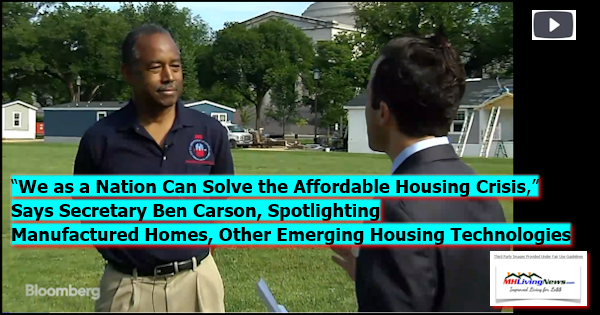In all languages, definitions and the meanings of words matter. “A manufactured home is not a motor home or trailer, and although it is often called a “mobile home,” it is not that either,” explained the National Fire Prevention Association (NFPA) in their report which then illustrates why the language matters. The NFPA report that made that pithy observation explained that manufactured homes are about 3 times safer against a fire than a mobile home and are about as safe, or safer, than conventional site-built housing against a fire, even though they are only about half the cost per square foot. That safety report continued: “A manufactured home is a structure built on a chassis and designed to be towed by a [specialized heavy-duty] vehicle [i.e.: truck or “totter”] to a permanent or semi-permanent site, where it will be used as a single-family residence.” That said, Newsmax weekend show and rising syndicated talk radio host, Rob Carson, has repeatedly and errantly called manufactured homes “trailers.” Carson has done so though this issue was directly brought to his attention. Similarly, financial advice guru Dave Ramsey has oddly, and per the evidence, mistakenly called manufactured homes “mobile homes.” Facts are what they are, and inaccuracies – regardless of who shares them – ought to be corrected. Ramsey has further repeatedly erred by falsely asserting that buying a manufactured home is ‘like buying a car you sleep in,” then inaccurately claiming ‘they lose value like a car’ (see below).
To be clear and fair, Carson has told his listeners he has personal ties to ‘trailers.’ He apparently doesn’t think he is slurring the roughly 22 million Americans who own and/or live in a pre-HUD Code manufactured home (about 20 percent of that 22 million residents) or a post-HUD Code manufactured home (about 80 percent of that 22 million Americans). But no matter how innocently Carson’s remarks may be uttered, wrong is still wrong.
Due in part to the infamous remark by Democratic political operative James “Jim” Carville, “Drag a hundred-dollar bill through a trailer park, you never know what you’ll find,” the word ‘trailer’ when used in a mobile home or manufactured home context is routinely considered a slur. Quoting: “Trailer is akin to a slur,” said a headline of The Morning Call digital edition on 2.7.2020.
CBS News found themselves on both sides of the terminology fence, with a professional in their news video item explaining that trailer is a slur, because of the unjust connection of ‘trailer trash’ that Carville’s infamous comment played on. Even if numbers of manufactured homeowners, often due to years of regrettable cultural conditioning, themselves may say ‘trailer’ or ‘mobile home,’ that still doesn’t make it correct. But why?
Note: errors may be common, but they can still be errors
Contrast what CBS’ show did with what the first Office of Manufactured Housing Programs (OMHP) administrator, William Wade “Bill” Matchneer, J.D., said in this illustrated video are the facts about modern manufactured housing.
Because as the NFPA noted, this boils down to a matter of definitions and the proper vs. improper use of words. Manufactured homes are safer due to the difference in construction standards. Manufactured homes are not a mobile home, nor are mobile homes a ‘trailer house.’ The photos below illustrate each type of housing. As attorney and manufactured home professional Steve Duke, J.D., explained: “The terminology matters because the terminology determines the construction standards a home was built to.”


The Associated Press (AP) is supposedly wrestling with the guidance on this topic, which the Manufactured Housing Institute (MHI) may have regrettably muddied and slowed. Those linked, behind the scenes, points noted, the AP Stylebook was provided this expert guidance about a year ago. It shows proper definitions as well as visual clues as to what type of house is an actual trailer, what is a mobile home, and what is a manufactured home.
To Dave Ramsey’s apparently flawed advice is illustrated with these true and apparently flawed or false remarks from 11.14.2022. “Mobile homes have come a long way since your grandparents’ time. The trailer homes of the 1950s have given way to the homes of today—and sometimes, you can hardly tell the difference between the two without a good, hard look.
Better-looking options at affordable prices are helping mobile homes make a bit of a comeback these days. And thanks to the red-hot housing market in most areas, many people are considering saving money by downsizing to mobile homes. Sounds good, right? But is this a good idea in the long run?
Nope!
Mobile homes are a terrible investment because they drop in value super fast—the same way your car loses value the second you drive it off the lot.”
Those are Ramsey’s words, and as what follows below demonstrates, they are often wrong. Ramsey has been advised directly by MHLivingNews and others publicly before. Yet, he continues to double down on errors. It is regrettable, as some of his other advice has merit. But when a source provides a mix of good and bad information and won’t make corrections, it may have the tendency to cause thinking people to wonder what other errors a source may be providing their followers.
This graphic below from Ramsey is a summary of some of his claims and then in the call out box by MHLivingNews, a brief explanation of his errors is provided below.

Additional Information with MHVille Expert MHLivingNews Commentary and Analysis
So, despite Ramsey being informed otherwise, he has continued years of prior habitual misuse of terminology. A few points may be useful to the public at large.
- First, Ramsey should know that there have been no ‘mobile homes’ built in the U.S. since June 15, 1976.
- Second, the National Association of Realtors (NAR) research are among those who have debunked the claim that properly installed manufactured homes fail to hold up in severe weather. Yes, a very limited number of mobile homes, manufactured homes, and site built housing get damaged or destroyed every year. But the numbers lost annually are thankfully only a tiny fraction of a percent. The odds are wildly in favor of someone living in a manufactured home that they will never but hurt, harmed, or killed in this type of factory-built home. See the linked information further below.
- Third, see the graphic above that sums up in rapid-fire fashion the evidence-based statements that arguably rebut and correct each of Ramsey’s errors.
No less a figure than prior HUD Secretary Ben Carson took on some of these mistaken notions about terminology and the safety, value, and durability of modern manufactured homes.
As HUD Secretary, Dr. Ben Carson pushed back against the false claims about modern manufactured homes. He did so numerous times. See the examples with videos in the report linked below.

Regardless if someone is from the political left (as is Carville), center, or right (as is, for example Dr. Carson), the use of improper terminology ought to be avoided.
This should be especially true when the terminology in question is hurtful, misleading, or is otherwise harmful.
For example. Some blacks may call themselves or other blacks the n-word, but that doesn’t make it proper. Who used that example? The Rev. Donald Tye Jr., a black man. Rev. Tye Jr., whose family grew up in a pre-HUD Code factory built home, has praised this housing option for years, as an online search will reflect. Tye has underscored the point that no manufactured home should be called a trailer or mobile home. A video interview with Tye is found at this link here.

Among Ramsey’s obvious errors that research has debunked is this example. LendingTree has reported two years in a row that manufactured homes are routinely appreciating. As the report linked below reflects, manufactured homes are appreciating faster in over two dozen states than are site-built housing. So, Ramsey’s financial advice – his forte, his expertise – when it comes to housing is apparently factually WRONG.
Ramsey and his company have been advised in writing of this error previously. He may never make the correction. That problem is obviously on him. But as noted above, it sparks the question. If Ramsey is wrong on this, what else is he mistaken on? Does Ramsey and his firm lack the humility to make a public statement that corrects his repeated errors?
Here is what the Society of Professional Journalism (SPJ) Code of Ethics says about errors once they are discovered. While this may or may not be taken to heart by Rob Carson or Dave Ramsey and his firm, they are nevertheless an illustration of what a true professional ought to do (particularly see the remarks with the orange arrow).

Like Ramsey, Rob Carson has been advised in writing on this specific error on his part. Only time will tell if he will ever make the correction. Those who know the truth but deliberately misstate the facts are a shame for the ones making the incorrect remark, be it about manufactured housing, blacks, or any other kind of prejudice, bias, bigotry, or ignorance.
That said, does pundit Carson, who routinely has interesting and sometimes funny remarks from the political right, honestly want to be on the same page as his political opposite in Carville? Does Carson really want to, perhaps unwittingly, risk alienating millions of potential listeners?
Whatever one’s politics or ethnicity, people of good will ought to use correct terms. To do otherwise might be ignorant or otherwise problematic.
For the Millions Who Live in a Mobile Home or Manufactured Home
For those who live in a mobile home or a manufactured home, they have a stake in this terminology issue. It could be summed up like this. Which do you think will have a higher resale value, a trailer? Or a manufactured home? Will a mobile home sell for more, or will a manufactured home bring a higher value? Doesn’t the latter term – manufactured home – sound better, more sophisticated, and thus more appealing? It ought to be obvious.
But even for those who will never plan to sell, doesn’t the greatest degree of separation from the derogatory term ‘trailer trash’ make sense?
This writer has been repeatedly asked to address this terminology issue. Once is obviously not enough. Years of misinformation require periodic corrections. But each one that reads this could email a link, post a link, share an appropriate quote, or otherwise get the word out to others.
Two (or more) wrongs have never made something right. It is entirely proper to use the right terminology each and every time someone is speaking about a mobile home or manufactured home. Enough said about that for today. ##


https://www.manufacturedhomelivingnews.com/preliminary-tornado-data-2021-national-weather-service-iii-org-surprising-hopeful-facts-for-affordable-housing-seekers-impact-on-conventional-housing-mobile-home/





https://www.manufacturedhomelivingnews.com/new-freddie-mac-research-brief-says-majority-of-consumers-would-consider-purchasing-a-manufactured-home-most-have-good-perception-of-manufactured-housing-facts-analysis/







That’s a wrap on this installment of “News through the lens of manufactured homes and factory-built housing” © where “We Provide, You Decide.” © ## (Affordable housing, manufactured homes, reports, fact-checks, analysis, and commentary. Third-party images or content are provided under fair use guidelines for media.) (See Related Reports, further below. Text/image boxes often are hot-linked to other reports that can be access by clicking on them.)

By L.A. “Tony” Kovach – for MHLivingNews.com.
Tony earned a journalism scholarship and earned numerous awards in history and in manufactured housing. For example, he earned the prestigious Lottinville Award in history from the University of Oklahoma, where he studied history and business management. He’s a managing member and co-founder of LifeStyle Factory Homes, LLC, the parent company to MHProNews, and MHLivingNews.com. This article reflects the LLC’s and/or the writer’s position, and may or may not reflect the views of sponsors or supporters.
Connect on LinkedIn: http://www.linkedin.com/in/latonykovach
Recent and Related Reports:
The text/image boxes below are linked to other reports, which can be accessed by clicking on them.
Celebrities, Millionaires, Billionaires and Their Appealing Manufactured Homes
Billionaire$ and Millionaire$ Proudly Hang Out in New York Manufactured Homes, Condo Resort
 manufacturedhomelivingnews.com Manufactured Home Living News
manufacturedhomelivingnews.com Manufactured Home Living News





































